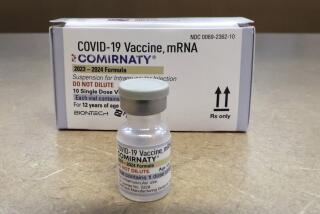For the Elderly, Getting That Flu Shot Can Be a Lifesaver
- Share via
Each winter, millions of Americans are sidelined by headaches, fever and severe muscle aches brought on by the flu. Most of us recover after a week in bed, nursing myriad miserable symptoms. For elderly people, though, the consequences can be far more serious.
Last year, the Centers for Disease Control and Prevention reported about 20,000 flu-related deaths, most of them among people over 65.
Medical experts say an annual flu shot is a good defense against the illness and its deadly consequences, such as pneumonia. And they’re working hard to get out the word that if you’re older than 65, suffer from chronic pulmonary, cardiovascular disorders or asthma, or have had treatment for diabetes, kidney problems, immune system disorders or blood abnormalities during the past year, a simple shot can save your life.
“The flu virus lowers the body’s resistance to infection, and older people are particularly at risk because their immune systems may not function as efficiently,” says Dr. Patrick Coll, associate director of the Center on Aging at the University of Connecticut Health Center. “The vaccine is extremely effective protection against the flu and the serious complications that can follow.”
Influenza is a contagious virus that spreads in the spray from coughs and sneezes. The infection enters your body through your nose or mouth. Symptoms include high fever, sore throat, headache, weakness and fatigue, and severe muscle aches.
Coll says myths about the flu and the vaccine are the biggest barriers to more widespread inoculations.
“Some people shy away from shots. Others think they’re going to have a very bad reaction or get the flu from the flu shot, that they don’t need to get a shot this year because they had one last year, or that they’ve experienced the flu and it really isn’t that serious,” Coll said.
Although you may experience some soreness at the injection point, you won’t get the flu from a flu shot, Coll said.
“The only people who shouldn’t get a flu shot are those who are allergic to eggs, have a fever when the shot is being given, have had a prior severe allergic reaction to a flu vaccine or who are pregnant,” Coll added.
*
A free brochure called “Flu” is available from the National Institute of Allergy and Infectious Diseases. Send single-copy requests with your name and address to NIAID, Building 31, Room 7A50, 31 Center Drive, Bethesda, MD 20892-2520.
More to Read
Sign up for Essential California
The most important California stories and recommendations in your inbox every morning.
You may occasionally receive promotional content from the Los Angeles Times.













